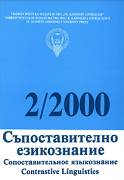Why use machines for empirical discovery in linguistics?
Why use machines for empirical discovery in linguistics?
Author(s): Vladimir PericlievSubject(s): Theoretical Linguistics, Applied Linguistics, Computational linguistics, Philology
Published by: Софийски университет »Св. Климент Охридски«
Summary/Abstract: The article is a report of four discovery systems, operating in linguistics. All of these address „empirical“ discovery, or discovery from data. The first program models the familiar induction methods of John Stuart Mill, the second performs componential analysis of kinship terms, the third is a general concept-discrimination program, and the fourth can discover word order universals and write a report in English, summarizing its discoveries. These systems are briefly described and some arguments are offered in favour of machine-aided empirical discovery in linguistics. The arguments refer to the strength of machines in computationally complex tasks, the guaranteed consistency of machine results, the portability of machine methods to new tasks and domains, and the potential machines provide for our gaining new insights.
Journal: Съпоставително езикознание / Сопоставительное языкознание
- Issue Year: 2000
- Issue No: 2
- Page Range: 126-147
- Page Count: 22
- Language: English
- Content File-PDF

